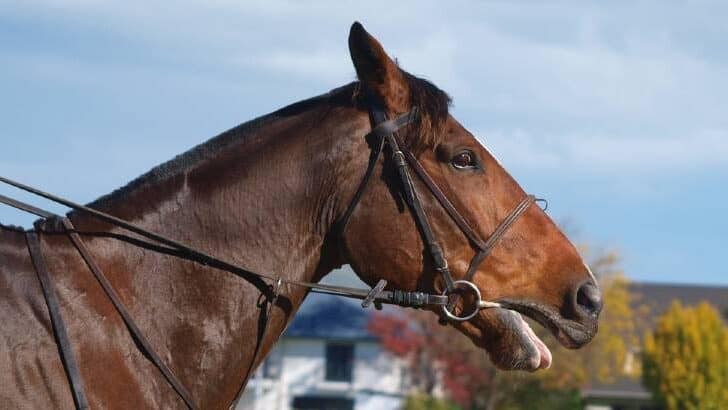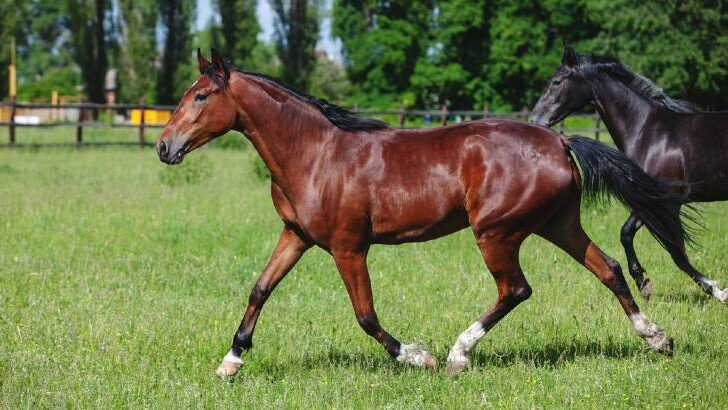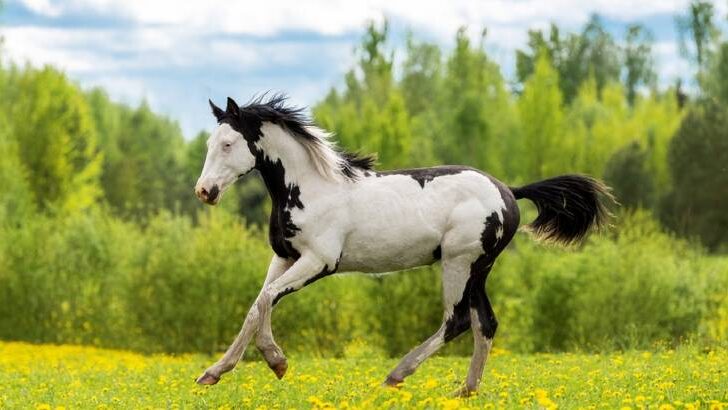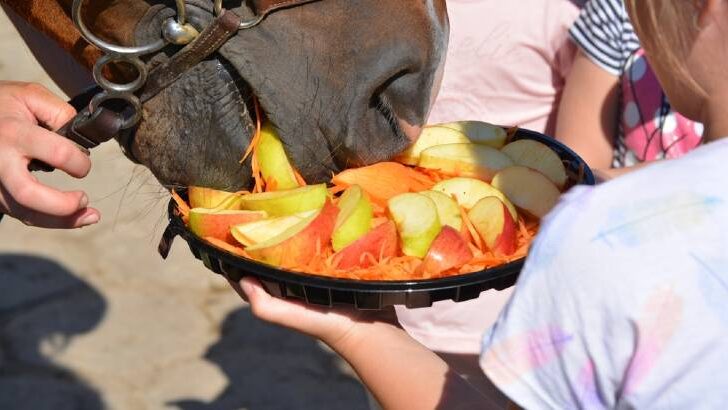Affiliate Disclaimer
As an Amazon Associate I earn from qualifying purchases. It helps me keep the website going. Thank you for your support.
Part of the beauty of horses is how different they are from one another. Personality traits, quirks, likes, and dislikes vary from horse to horse, as do habits. Unfortunately, horses are susceptible to developing bad habits if their owners, handlers, and riders aren’t careful. Behaviors like rooting at the bit are annoying at best, and unhealthy or dangerous at worst. So, what causes a horse to start rooting at the bit?
In most cases, two main things cause this habit: pain/discomfort or rider error. Rooting at the bit is particularly frustrating when you’re trying to work your horse in the arena and/or ride with contact. It can be a tough one to figure out, but it’s not impossible to fix.
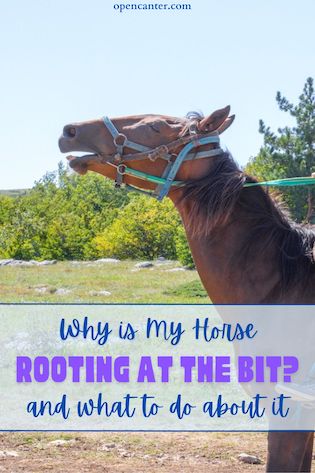
What is Rooting at the Bit?
Put simply, it’s when a horse pushes against the bit and pulls its head down suddenly. Most often, this will either pull the reins out of your hands or force you off balance.
From a practical perspective, this is problematic for many reasons:
- It can be painful for you as the rider if the movement is sharp enough.
- It breaks the focus and concentration for you and the horse.
- Breaking contact/position/rhythm can ruin the exercise you’re working on.
- If they do it on course, you may have a more difficult time setting up for your next jump.
- If school horses pick up the behavior, it can make rides frustrating for multiple people.
Beyond being annoying and inconvenient, there can be some more serious implications to this behavior. Whether your horse came to you with the habit or has developed it recently, it’s important to get to the root cause.
Why is My Horse Rooting at the Bit?
Rooting at the bit is usually an evasion tactic for horses who want to get out of doing work. As soon as any horse succeeds just a few times, they’ve learned how to get what they want. This is when it becomes a habit and often requires a more experienced rider to break.
Why do these horses so badly want to get out of work, though? This is where it gets a little deeper. It could be that the horse is lazy and has simply chosen this method to try and do as little as possible. Some horses are indeed a little cheeky and naughty like this, but it’s often more than simple disobedience.
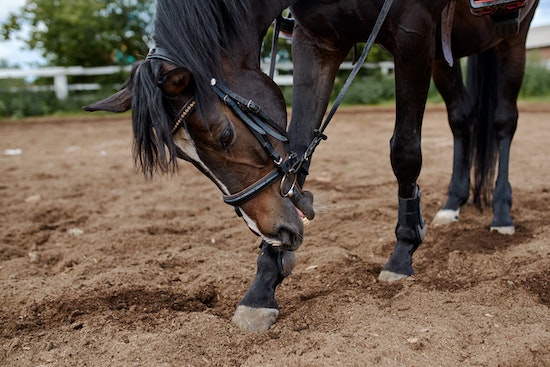
Excessive Contact
This is one of the easiest and most common ways to develop a rooting habit in your horse. In most cases, you want to have at least a little contact with your horse’s mouth. But, the most successful contact is balanced and soft.
Riding with a constant death grip and/or misusing a strong bit will almost always have a horse trying to evade the uncomfortable pressure. If this isn’t something you struggle with, it’s possible a past rider did.
Even if it was a long time ago, habits are hard to break and horses have good memories. If they remember how unpleasant that previous experience was, they may still try to evade your contact months or years later.
Physical Discomfort
If maintaining even soft contact is causing your horse any amount of pain, it’s natural they’ll try to avoid it. Too much pain can cause even the most obedient and good-natured horse to start rooting.
So, if you can’t understand why your horse would be “bad” like this, don’t immediately jump to punishment or fighting. In a tug-of-war match, the horse will always win anyways! Instead, consider and investigate a physical cause.
There are a few common ailments that can cause rooting at the bit:
- Overdue teeth. A horse’s teeth are always growing. Generally, they should be floated about once per year, though some horses may need more or less. If your horse is overdue, the bit may be applying more pressure than usual or sitting painfully in their mouth.
- Broken teeth. If their teeth aren’t overgrown, one may be broken or cracked. Depending on the location, this can cause great pain from the bit.
- Sore hocks. Evading contact could be their way of taking weight and pressure off their back end. Especially in performance horses, arthritic hocks are fairly common as they get older. If your teenage horse has recently started rooting inexplicably, hock x-rays are likely in order.
While these three are the most likely culprits, they are not the only potential reasons. Horses are large animals and we ask a lot of them. Consequently, there are a lot of little things that can go wrong in their bodies.
If you’ve ruled out teeth and hocks, don’t stop looking. Things like misaligned joints, a sore neck, a stiff back, and more are all possibilities.
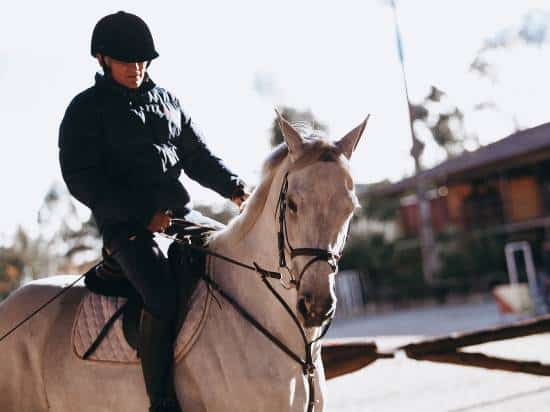
What to do if Your Horse is Rooting at the Bit
Of course, the first step is to determine the root cause, especially if it’s pain. However, rooting at the bit is a habit that often continues long after the root cause has been addressed.
This is because they’ve now learned that it’s a way to evade contact and avoid work. Even if they used to be in pain and are no longer, you still have to break the habit.
There are a few things you can do to start:
- More leg. First and foremost, encourage the horse to move forward at the first sign of rooting. This teaches them that pulling the bit = having to move faster. It also keeps their head up and makes it easier for you to maintain your grip on the reins.
- Soften the hand. Rooting at the bit requires the horse to have something to pull against. If you don’t give them anything to pull against, they’ll hopefully stop trying.
- Change the bit. This one must be handled with caution. There’s a whole world of bits out there, offering varying degrees of pressure, leverage, and strength. A “stronger” bit isn’t necessarily the right answer, but perhaps something with more leverage or even a pulley system. However, the wrong bit in the wrong hands can make things worse, so only do this with an experienced hand.
Ultimately, this is an issue that requires patience and understanding. You must acknowledge that curing the issue will take time, no matter the method that works best for you.
The above suggestions are only a baseline; you know your horse better than anyone. It’s also important to work with a trainer or coach in circumstances like this.
Final Thoughts
Riding your horse is supposed to be fun, relaxing, and joyful. Habits like rooting at the bit can put a damper on the whole experience, for you and your horse! It’s something you should take care of, but always make sure you approach it with kindness and not anger. The most important thing is to ensure your horse isn’t in any pain. From there, you can work on breaking the habit. With patience and consistency, rooting at the bit is something most horses can overcome

